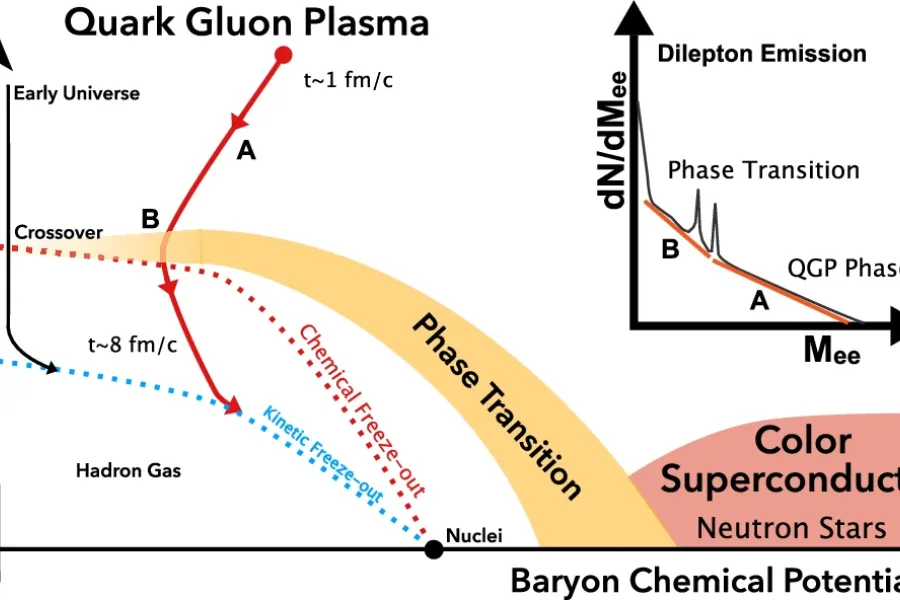Center for Nuclear Research

�鶹��ѡScientists Help Measure Primordial Matter at Trillions of Degrees
UPTON, N.Y. — October 14, 2025 — An international team of researchers has directly measured the temperature of quark-gluon plasma (QGP) — the superhot primordial matter that filled the universe just millionths of a second after the Big Bang. Among the leaders of this breakthrough is Kent S…
US DEPARTMENT OF ENERGY GRANTS PRESTIGIOUS RESEARCH AWARD TO PHYSICS PHD STUDENT
US Department of Energy grants graduate student research award (SCGSR) to Physics PhD student Maci Kesler at �鶹��ѡ

�鶹��ѡ physics alumna Dr. Dekrayat Almaalol receives 2024 Leona Woods Lectureship Award
�鶹��ѡ Physics alumna Dr. Dekrayat Almaalol receives 2024 Leona Woods Lectureship Award from Brookhaven National Laboratory.

Dr. Zhangbu Xu joins the �鶹��ѡ Department of Physics faculty
The �鶹��ѡ Department of Physics is proud to welcome our newest faculty member, Dr. Zhangbu Xu.
Physics professor receives a DOE topical collaboration grant to study heavy-quark physics
Dr. Michael Strickland's group will participate in a new Topical Theory Collaboration funded by DOE’s Office of Nuclear Physics to explore the behavior of heavy flavor particles. The collaboration will receive $2.5 Million from the DOE Office of Science, Office of Nuclear Physics, over five years. That funding will provide partial support for six graduate students and three postdoctoral fellows at 10 institutions, as well as a senior staff position at one of the national laboratories. It will also establish a bridge junior faculty position at �鶹��ѡ.

Research and Innovation Advisory Board Helps Put Donor Dollars to Good Use
The newly formed “Research and Innovation Advisory Board” within the College of Nursing is helping to connect donor-provided funds with faculty and students who are participating in nursing research. The board, consisting of tenured faculty, non-tenured faculty, grant administrators and other leader…
Department of Energy Selects �鶹��ѡNuclear Physics Doctoral Student for Prestigious Research Program
Edwin Duckworth, a physics doctoral student in the College of Arts and Sciences at �鶹��ѡ, is among 65 students from 29 states recently selected for funding by the Department of Energy’s (DOE) Office of Science Graduate Student Research (SCGSR) program. The program aspires to “address societal challenges at national and international scale.”

New Collaboration to Provide Real-Time Data Exchanges for Astrophysicists
What happens when two neutron stars collide? What extreme densities and temperatures are reached? What new states of matter exist within the core of a neutron star? One �鶹��ѡCollege of Arts and Sciences theoretical astrophysicist, Veronica Dexheimer, associate professor in the Department of Physics, is diving headfirst into these questions as a co-principal investigator collaborating with her peers at multiple institutions on a recently funded cyberinfrastructure research grant project.

Dedication to Diversity: Dr. Tracey Motter Builds a Pathway to a Diverse Nursing Workforce
Although widely acknowledged that greater diversity among nurses reduces health disparities and improves quality of care, the U.S. nursing workforce does not mirror the nation’s increasingly diverse population.

Nuclear Physicist Tracks Rare Collided Particles to Better Understand Big Bang
Congratulations are in order for Sooraj Radhakrishnan, Ph.D., a postdoctoral fellow in the �鶹��ѡ College of Arts and Sciences’ Department of Physics who performs research in experimental nuclear physics. His data analysis of some rare particles called “charm quarks” that may have existed in the first microsecond of the Big Bang, the emerging point of our universe, was highlighted in a recent issue of the .